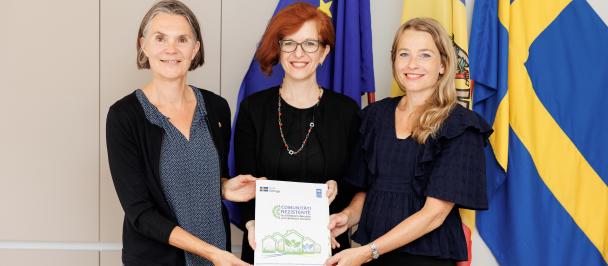Switzerland increases assistance to Moldovan agriculture, focusing on energy efficiency and sustainable production
August 9, 2024

Photo: FAO Moldova
The Swiss Agency for Development and Cooperation is supplementing the funds allocated to the project "Emergency support for agri-producers in the context of the socio-economic, climate and energy crisis" with an additional US$1,155,000. The project is implemented by the Food and Agriculture Organization of the United Nations (FAO) and the United Nations Development Programme (UNDP). The joint initiative was launched in 2022 and was funded with an additional $2 million by the Austrian Development Agency (ADA). In November 2023, Switzerland provided $2 million to the project.
Under the UNDP-managed component, eight women agricultural producers affected by the socio-economic and energy crisis will be supported to increase the energy efficiency of their farming operations by providing them with equipment and services totalling approximately $200,000.
Previously, another 46 women-led enterprises received similar support. Thus, photovoltaic panel systems, biomass boilers, heat pumps and biomass boilers have been installed, so as various energy efficiency measures in warehouses and production facilities have been implemented.
Moreover, the financial support of approximately $915,000 granted by Switzerland through FAO will improve food security and maintain the livestock of cattle in households affected by the drought in recent years, which has drastically reduced the corn harvest - the main source of feed for animals.
The budget supplementation will increase the number of beneficiaries from 12,000 to 17,000 small farmers and households who will receive concentrated feed for milking cows, alfalfa seeds, corn, and fertilizers. Due to the diversification of agricultural production and increased access to quality feed, farmers will be able to produce more healthy and nutritious foods for their consumption and sale. This will help reduce poverty and improve living standards in rural areas.
Additionally, with the funds provided by Switzerland, FAO will continue the implementation of Farmer Field Schools (FFS), an efficient instrument for acquiring the best agricultural practices among farmers. In addition to the existing 15 FFS established nationwide, another 5 FFS specialized in cow milk production and conservative farming practices in cereal production will be developed in 5 districts in the northern part of the country.
Moreover, each Farmer Field School will be outfitted with a No-Till seeder designed for no-plow land processing. This sustainable agricultural practice not only supports environmental conservation but also bolsters farmers' ability to adapt to climate change. Large-capacity No-Till seeders will also be provided to the agricultural research institutions in the country.
Equipment will also be received by the 50 households trained within the Farmer Field Schools that produce and market milk. These households will be provided with milking machines to improve milking hygiene, enhance milk quality and facilitate working conditions.
Both small ruminant farmers and goat breeders will also benefit from this funding. FAO aims to strengthen the micro-cluster of shepherding from Cimișlia and Basarabeasca districts, created earlier through a joint initiative of UNDP and Switzerland, by providing modern equipment such as electric fences and milking machines to improve animal husbandry practices and enhance the quality of dairy products, thereby contributing to the sustainable development of the sector.
***
The significant dependence of the Republic of Moldova on imports of agricultural and energy products from Ukraine and Russia has made it particularly vulnerable to external shocks. Disruptions in the supply chains of agricultural inputs, such as fertilizers, seeds, and pesticides, as well as the increase in diesel fuel costs, have significantly affected agricultural producers. Although there was a slight decrease in the prices of some inputs in 2023, they remain historically high, leading to a 4% increase in production costs for wheat, 4.8% for corn, and 13.5% for sunflower compared to 2021.
Simultaneously, the substantial increase in the transit of Ukrainian agricultural products through the territory of the Republic of Moldova led to a significant drop in prices for local basic cereals. Wheat prices fell by 50%, barley by 46%, corn by 30.9%, and sunflower by 20% in comparison with 2023. This situation has posed major challenges for farmers, with prices remaining at extremely low levels at the beginning of 2024.

 Locations
Locations



